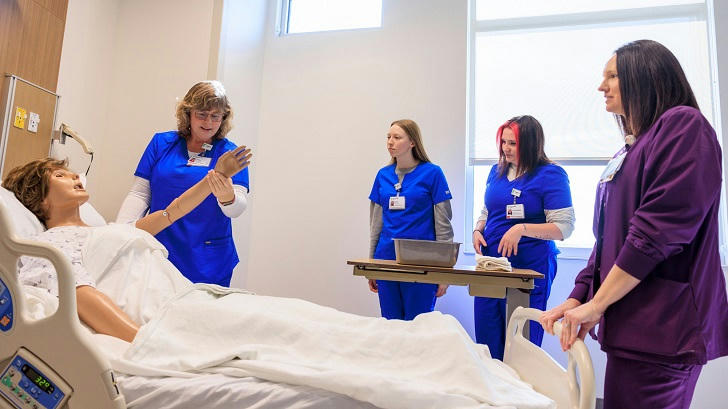From Training to Certification: A CNA’s Journey
Embarking on a career as a Certified Nurse Assistant (CNA) is a transformative journey that opens the door to a world of opportunities in healthcare. From completing rigorous training programs to passing the certification exam, this pathway equips individuals with the skills and confidence needed to excel in one of the most rewarding fields.

Step 1: Choosing the Right Training Program
The first step to becoming a CNA is enrolling in a state-approved training program. These programs are offered by community colleges, vocational schools, and some healthcare facilities. Lasting anywhere from 4 to 12 weeks, they provide a comprehensive introduction to the profession.
Training programs typically cover:
Basic Nursing Skills: Techniques for assisting patients with hygiene, mobility, and meals.
Emergency Procedures: How to handle critical situations such as cardiac arrests or falls.
Infection Control: Best practices for maintaining a sterile environment.
Patient Interaction: Effective communication and empathy in caregiving.

Many programs also include specialized modules for working with elderly patients or individuals with chronic illnesses, preparing students for roles in long-term care.
Step 2: Gaining Hands-On Experience
Clinical training is a crucial component of CNA education. Under the supervision of experienced instructors, students practice their skills in real-world settings like hospitals or nursing homes. This hands-on experience not only builds confidence but also provides a glimpse into the day-to-day realities of the job.
Step 3: Passing the Certification Exam
After completing their training, aspiring CNAs must pass a state-administered certification exam. The test typically consists of two parts:
Written Exam: Multiple-choice questions assessing theoretical knowledge.
Skills Test: A practical demonstration of caregiving abilities, such as taking vital signs or assisting with patient transfers.

Adequate preparation is key to success. Many training programs offer practice exams and review sessions to help students feel ready.
Step 4: Launching a Career
Once certified, CNAs can begin their careers in various settings. Common options include:
Hospitals: Assisting patients in acute care units.
Nursing Homes: Providing long-term care for elderly residents.
Home Healthcare: Supporting patients in their own homes.
Rehabilitation Centers: Helping individuals recover from surgeries or injuries.

Step 5: Exploring Career Growth Opportunities
A CNA role is just the beginning of a healthcare career. Many professionals use their experience as a stepping stone to advanced roles. For example, CNAs can pursue further education to become Licensed Practical Nurses (LPNs) or Registered Nurses (RNs), opening doors to higher salaries and leadership positions.
A Journey Worth Taking
The path from training to certification is challenging but immensely rewarding. CNAs not only gain valuable skills but also make a profound impact on the lives of their patients. For those drawn to healthcare, this journey offers both personal fulfillment and professional success.
Case 1: From Waitress to CNA in an Emergency Department
Background:
Maria, a 35-year-old single mother, worked as a waitress in a restaurant with unstable hours and low income. Although she had an interest in healthcare, she had no prior medical background.
Turning Point:
Maria enrolled in a CNA training course at a local community college. The program provided her with basic medical knowledge, patient care skills, and clinical experience. After completing the course and passing the state certification exam, she quickly secured a CNA position at a local hospital.
Outcome:
Maria’s income increased from $12 to over $20 per hour. She also gained stable working hours and benefits such as health insurance and a retirement plan. Encouraged by her success, Maria enrolled in a CNA-to-LPN (Licensed Practical Nurse) bridge program and is now working toward further advancing her career.
Case 2: From Odd Jobs to Supervisor in a Long-Term Care Facility
Background:
James, a retired veteran, worked unstable construction jobs after leaving the military. He wanted a career with growth potential but was limited by only having a high school diploma.
Turning Point:
Through a veteran funding program, James was able to attend a CNA training course free of charge. The program equipped him with medical knowledge and hands-on experience in patient care. After completing the training, James was hired as a CNA at a long-term care facility.
Outcome:
James started with an hourly wage of $18. Within a year, his outstanding performance earned him a promotion to supervisor, where he managed a team of caregivers and earned $28 per hour along with additional benefits. He plans to continue his education with the goal of becoming a Registered Nurse (RN).
Case 3: From Zero Experience to Private Caregiver
Background:
Lily, a 22-year-old community college graduate, majored in a non-nursing field but became interested in the healthcare industry. Without a clear career direction, she wanted to enter the workforce quickly and gain experience.
Turning Point:
Lily enrolled in an 8-week CNA program and was promptly hired by a private home care agency. Her focus was on providing one-on-one care to clients from high-income families.
Outcome:
Lily’s hourly wage reached $25, significantly higher than many of her peers’ starting salaries. Her flexible working hours allowed her to gain valuable caregiving experience, laying the foundation for becoming a home nurse or starting her own caregiving service business in the future.
These inspiring stories highlight how CNA training can serve as a powerful springboard for career transformation, financial growth, and personal fulfillment. Whether you’re starting from scratch, seeking stability, or looking to explore new opportunities in healthcare, a CNA certification offers a solid foundation for success.
As the demand for compassionate and skilled caregivers continues to grow, the possibilities for CNAs are limitless. With dedication and continuous learning, you too can carve a rewarding path in this dynamic and meaningful field. Embrace the opportunity, and take the first step toward building a brighter, more secure future for yourself and those you care for. The journey may start with a CNA program, but where it leads is entirely up to you.
